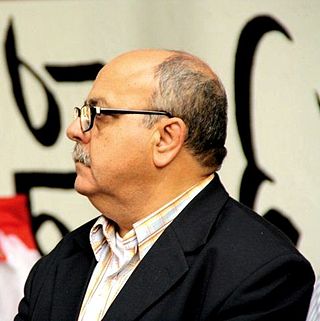
Islamic dietary laws are laws that Muslims follow in their diet. Islamic jurisprudence specifies which foods are halal and which are haram. The dietary laws are found in the Quran, the holy book of Islam, as well as in collections of traditions attributed to the Islamic prophet Muhammad.

Halal is an Arabic word that translates to 'permissible' in English. In the Quran, the term halal is contrasted with the term haram. It is used to refer to actions, behaviors, or items that are allowed under the teachings of Islam. Halal applies not only to food but also to various aspects of life, including finance, clothing, and behavior. Its opposite is haram, which means "forbidden" or "unlawful". The concept of halal is central to Islamic practices and is derived from the Quran and the Sunnah. The guidelines for what is considered halal or haram are laid out in Islamic jurisprudence (fiqh), and scholars interpret these guidelines to ensure compliance with Islamic principles.

Yusuf al-Qaradawi was an Egyptian Islamic scholar based in Doha, Qatar, and chairman of the International Union of Muslim Scholars. His influences included Ibn Taymiyya, Ibn Qayyim, Sayyid Rashid Rida, Hassan al-Banna, Abul Hasan Ali Hasani Nadwi, Abul A'la Maududi and Naeem Siddiqui. He was best known for his programme الشريعة والحياة, al-Sharīʿa wa al-Ḥayāh, broadcast on Al Jazeera, which had an estimated audience of 40–60 million worldwide. He was also known for IslamOnline, a website he helped to found in 1997 and for which he served as chief religious scholar.
Haram is an Arabic term meaning 'forbidden'. This may refer to either something sacred to which access is not allowed to the people who are not in a state of purity or who are not initiated into the sacred knowledge; or, in direct contrast, to an evil and thus "sinful action that is forbidden to be done". The term also denotes something "set aside", thus being the Arabic equivalent of the Hebrew concept חרם (ḥērem) and the concept of sacer in Roman law and religion. In Islamic jurisprudence, haram is used to refer to any act that is forbidden by Allah and is one of the five Islamic commandments that define the morality of human action.

Riba is an Arabic word used in Islamic law and roughly translated as "usury": unjust, exploitative gains made in trade or business. Riba is mentioned and condemned in several different verses in the Qur'an. It is also mentioned in many hadith.
In Islam, bidʿah refers to innovation in religious matters. Linguistically, the term means "innovation, novelty, heretical doctrine, heresy". Despite its common use in Muslim texts, the term is not found in the Qur'an.
In Islamic terminology, something which is makruh or makrooh is "disliked", literally "detestable" or "abominable". This is one of the five categories in Islamic law – wajib/fard (obligatory), Mustahabb/mandub (recommended), mubah (neutral), makruh (disapproved), haram (forbidden).
Muhammad Nasir al-Din known by his nisbaal-Albani, was an Albanian Islamic scholar known for being a famous Muhaddith. A major figure of the Salafi methodology of Islam, he established his reputation in Syria, where his family had moved and where he was educated as a child.

Purity is an essential aspect of Islam. It is the opposite of najāsa, the state of being ritually impure. It is achieved by first removing physical impurities from the body, and then removing ritual impurity through wudu (usually) or ghusl.
Muhammad Zahid Hasan, commonly known by the nisbaal-Kawthari, was an Islamic scholar and theologian. A prolific author of over 40 works, al-Kawthari followed the Hanafi school of jurisprudence and championed the Maturidi school of theology.

Tāj al-Dīn Abū'l-Faḍl Aḥmad ibn Muḥammad ibn ʿAbd al-Karīm ibn Abd al-Rahman ibn Abdullah ibn Ahmad ibn Isa ibn Hussein ibn ʿAṭā Allāh al-Judhami al-Iskandarī al-Shādhilī was an Egyptian Malikite jurist, muhaddith and the third murshid of the Shadhili Sufi order.
The Islamic views on tobacco vary by region. Though tobacco or smoking in general is not explicitly mentioned in the Quran or hadith, contemporary scholars have condemned it as completely harmful, and have at times prohibited smoking outright as a result of the severe health damage that it causes. A tobacco fatwa is a fatwa that prohibits the usage of tobacco by Muslims. Arab Muslims tend to prohibit smoking and, in South Asia, smoking tends to be considered lawful but discouraged.
According to Islam, animals are conscious of God. According to the Quran, they praise Him, even if this praise is not expressed in human language. Baiting animals for entertainment or gambling is prohibited. It is forbidden to kill any animal except for food or to prevent it from harming people.

Abdulrazak Eid, Abdul razzak Eid, Abdul razaq Eid, Abdel razzak Eid, Abdul razzaq Eid, or Abd al Razzaq 'Id is a Syrian writer and thinker and one of Syria's leading reformers. He helped to found the Committees of Civil Society in Syria, drafted the Statement of 1000 and helped to draft the Damascus Declaration. Because of his opposition writings and political actions, he was arrested many times in Syria, banned from working and traveling, kidnapped by the Syrian intelligence forces, and was threatened with being assassinated. He fled Syria in 2008 for exile in Europe where he was elected president of the National Council of Damascus Declaration in exile.

Ali Muhammad al-Sallabi, or al-Salabi is a Muslim historian, religious scholar and Islamist politician from Libya. He was arrested by the Gaddafi regime, then left Libya and studied Islam in Saudi Arabia and Sudan during the 1990s. He then studied in Qatar under Yusuf al-Qaradawi and returned to Libya during the 2011 overthrow of Gaddafi and distributed weapons, money, and aid to Islamist groups in the country. His actions were criticized by members of the internationally recognized Libyan government under the National Transitional Council who he in turn criticized as being secular.

Safiur Rahman Mubarakpuri was an Indian Islamic scholar, teacher and writer within the Salafi creed. His book Ar-Raheeq Al-Makhtum, won a prize at the first Islamic conference on seerah Muslim World League in 1978.

Khamr is an Arabic word for wine or intoxicant. It is variously defined as alcoholic beverages, wine or liquor.

Sharia and securities trading is the impact of conventional financial markets activity for those following the islamic religion and particularly sharia law. Sharia practices ban riba and involvement in haram. It also forbids gambling (maisir) and excessive risk. This, however has not stopped some in Islamic finance industry from using some of these instruments and activities, but their permissibility is a subject of "heated debate" within the religion.
The relationship between Islam and music has long been a complex and controversial matter. Many Muslims believe that the Qur'an and Sunnah prohibit music ; however, other Muslims disagree and believe that some forms of music are permitted. Despite this controversy, music has been popular and flourished at various times and places in the Islamic world, often in palaces and private homes to avoid censorship.

Fiqh al-aqallīyāt is a concept of principles of Islamic jurisprudence that has been discussed since the late 1990s, particularly among Arabic-speaking Muslims. It aims to develop a new system of Islamic behavioral norms that offers solutions for the specific ethical and religious problems of Muslim minorities living in Western countries by drawing on Ijtihad, i.e. finding norms through independent judgment. Tāhā Jābir al-ʿAlwānī (1935–2016), the founder and former chairman of the Fiqh Council of North America (FCNA), played a leading role in developing the concept. He coined the term and created one of the first program writings on fiqh al-aqallīyāt in 2000. According to al-ʿAlwānī, the minority fiqh is intended to help "overcome the psychological and spiritual division experienced by Muslim minorities, especially in the West, by making them a partner in these societies in happiness and unhappiness."











